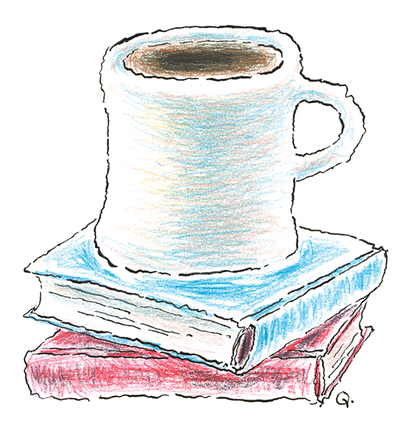Everything is Copy: On sabbatical

I have the best job in the world, though not because, as many outside academe believe, being a university professor is a cushy gig. True, I don’t have to go into a cubicle from 9 to 5 every day, I don’t have a manager bird-dogging me, and I don’t have to wear uncomfortable shoes.
Instead, each quarter I get to pick out a stack of books I love and discuss them with smart people. I am afforded access to the interior lives and passionate interests of students whose writing it is my privilege to read. I am surrounded by colleagues who believe, as I do, that literature helps us to live.
Teaching is only part of the job. I am expected to be a good citizen of the university and to help keep it running, hand in hand with full-time administrators. I try to remember that while their salaries are bigger, they come from faculty ranks and know how much better and more fun our jobs are. There is no us and them; they were and are us. I sit through too-long meetings and offer my ideas. It is my responsibility to have opinions.
While many professors go into the business because they like to teach, the fact is that we’re all here because we love – or at some earlier point, loved – research, scholarship, and/or creative work. We’ve spent time and energy getting a “terminal” degree, the highest credential in our fields, which required us to do something original, be it discover a protein, parse the history of the Freemasons, or finish a draft of a novel.
At a university like Eastern where teaching loads are high and research expectations low, publish or perish doesn’t exactly apply. People get points for teaching and service and the standards for publication are soft. But if you don’t do the minimum, you’re out of a job.
One of the misconceptions civilians often have about academic life is that we have summers off. While we don’t have to teach in the summer, we also don’t get paid. When I started, we would receive our last paycheck in June and then the money train stopped until October. Now we can choose to amortize our salary over 12 months. A social scientist friend told me that as an economist, he knew this wasn’t a smart move. As a human, it was his only realistic option. It’s hard to go that long without income.
Summer, when we’re not preparing for classes, grading, or sitting through cuticle-shredding meetings, is when we focus on our own stuff: traveling to archives, going into the lab to whack apart chains of amino acids, or scrapping a manuscript draft and starting over.
Summer is when we sweat. Serving on committees takes time but limited emotional energy, unless you get caught up in drama or volunteer for huge projects. Teaching is exhausting, but more rewarding than anything you can imagine. Seeing the achievements of my students, watching them change and grow over the course of a term, feeds and sustains me.
The act of creation – whether of a scholarly journal article on geothermal systems that will be read by than fewer than 10 people (including the editor, peer reviewers, and the writer’s family), positing a new theory to explain the uncanny behavior of the American electorate, or doing the dirty, back-breaking emotional archeology of writing personal essays – requires undistracted and determined effort. We need summer for that.
We also have sabbaticals. Every seven years, we can apply for professional leave (at decreased salary). We propose projects that will bring luster to the university and contribute in some way to the world. Despite the etymology, it is not a Sabbath, a break from labor. Instead it’s an opportunity to work differently, and just as hard.
Since January, I have been on sabbatical. I proposed to complete a draft of a novel. I managed to do that and shipped it off to my editor; he sent me a roadmap for revision, which I’d been excited to get cracking on.
Mice, some men, and nearly all women know what happens to the best-laid schemes. For the last two months I have written exclusively about a man I loved who drove his car into a tree. Sudden death has thrown me to places I didn’t know existed. I am trying to write my way out of Griefland.
At some point, I’ll dig up the notes on the trip I took while visiting Guatemalan coffee farms. I’ll say yes the next time I’m asked to contribute an essay to a collection. And I’ll get back to revising that novel.
Right now my task, as Carrie Fisher put it to Meryl Streep, is to take my broken heart and make it into art. A sabbatical allows me time and space to do that. Sitting at a coffee shop in another state – figuratively, literally – fingers flying and tears flowing, I know that I do have the best job in the world, am among the fortunate ones whose professional and personal lives are allowed to twine.
Rachel Toor is a professor of creative writing at Eastern Washington University. She is the author of one novel and five books of nonfiction.